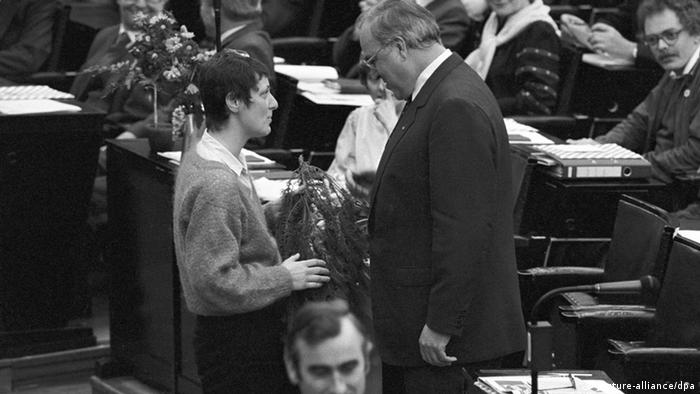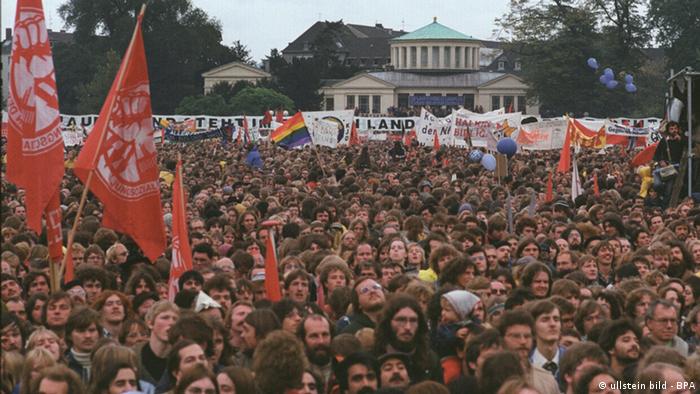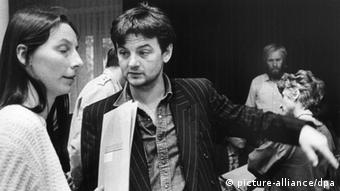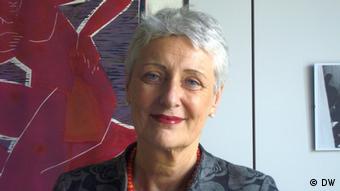From humble beginnings, the Green Party stirred up German politics when it entered parliament three decades ago. What started as a protest party is now an established part of the country’s political landscape.
In her hand-knitted, mohair sweater, Marieluise Beck stood out in the German Bundestag among lawmakers meeting to vote for chancellor on March 29, 1983. She was one of 28 new members of parliament elected in a national vote on March 6, 1983. “It was breathtaking,” she said. “It actually came as a shock for the political establishment in Bonn.”
Next to her, in a proper suit and tie, sat the leader of the Christian Democrats (CDU), Helmut Kohl – the new chancellor. Marieluise Beck congratulated him, though not with a customary bouquet of flowers.

The young Green politician handed the chancellor a sparse pine bough in the name of a citizens’ initiative to fight the decline of Germany’s forests.
Humble beginnings
The Green party had been founded just three years earlier, at a time when hundreds of thousands of West Germans were taking to the streets to protest the stationing of US intermediate-range, nuclear-warhead missiles on West German soil. Fearing the missiles represented the next phase in the global nuclear arms race, environmental, peace and human rights activists came together in January 1980. They viewed themselves as a peaceful, ecological, grass-roots democratic movement more than an actual political party – something of an “anti-party” party.
By the mid-1990s, however, the Greens had matured and outgrown those early stages. In 1998, the Greens entered into a national government coalition with the Social Democrats; Joschka Fischer became the country’s high-profile foreign minister and deputy chancellor. The party now had to prove it could govern. Key moments for the Greens came in a 1999 vote on German participation in military missions in Kosovo, as well as in an agreement with energy providers in 2000 on the phasing out of nuclear energy by 2021.

Re-orientation
The coalition of the Greens and Social Democrats was defeated in the 2005 parliamentary elections, sending Greens back to the opposition benches. Observers feared the party’s decline when Fischer, whom many regarded as the driving force within the party, left the political stage.
Beck recalled the worries surrounding Fisher’s departure, “The years have proven, however, that the party is carried by its issues.”
In the state of Baden-Württemberg in 2011, the immensely popular Winfried Kretschmann became the party’s first-ever Green state premier. The state capital, Stuttgart, is also ruled by a Green party mayor. In terms of coalition-building, the party has become a serious consideration for conservatives and Social Democrats alike. In opinion polls, its numbers have never been better.
Political weight

The history of the Greens is a success story, said Lothar Probst, a professor of political science at the University of Bremen. “They are what we call an ‘middle party’ that’s gets election results ranging from 10 to 20 percent,” Probst said, adding that such results put them ahead of smaller parties like the Left Party, the liberal Free Democrats, and the Pirates.
A reason for the party’s strength is that their voter base is much broader than it was decades ago. Today, the party is involved not just with environmental issues, but with a spectrum of topics including education, social justice, consumer and climate policies.
Running out of topics?
Where environmental topics were once the exclusive prerogative of the Green party, however, those issues have now become key issues across the political spectrum. Other parties now sponsor environmental legislation. After the 2011 Fukushima nuclear disaster, Chancellor Angela Merkel’s Christian Democrats became outspoken opponents of nuclear energy.

But that does not mean that Greens can forget about such issues, said Probst.
“We are still at the very beginning and are already facing many problems and conflicts,” he said.
Probst said he saw room for the Greens to get involved in current food scandals, an issue they have had success with in the past.
Beck, too, said she was convinced the Greens will not run out of issues.
“No one can dismiss ecological necessities, certainly not a growing global population that seeks – and has a right to – prosperity,” she said. “[People] must recognize that in the long run, growth can’t function at the cost of nature.”
Where will the Greens be in five years? Busy with the next election campaign, Beck said, and “hopefully on its way from one government to the next one.”
http://www.dw.de/germanys-greens-mark-30-years-in-parliament/a-16646538
Залишити відповідь